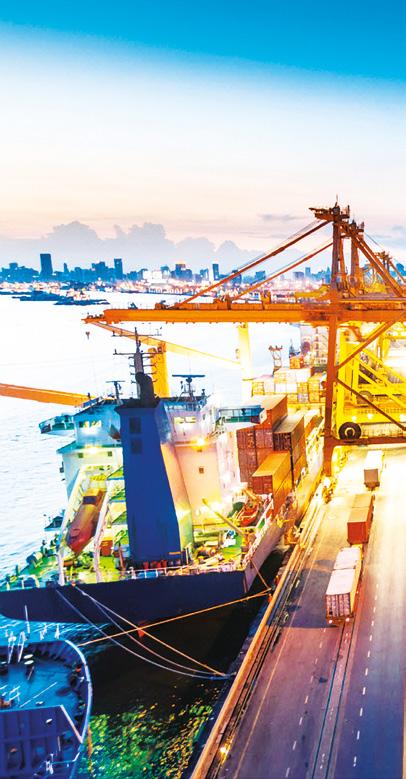
4 minute read
Vietnam’s economy poised to bounce back
Vu Van
While Vietnam’s economy has been seriously impacted by Covid-19, it remains resilient and is poised to bounce back, according to a new World Bank report.
Advertisement
remain positive
According to the latest Taking Stock report, titled “What will be the new normal for Vietnam? The economic impact of Covid-19”, released on 30 July, although the Vietnamese economy suffered from Covid-19 in the first half of 2020, prospects remain positive for both the short and medium term. If the world situation gradually improves, economic activity should rebound in the second semester of 2020 so that the economy will grow at around 2.8 percent for the entire year, and by 6.8 percent in 2021. With less favorable external conditions, the economy will expand by only 1.5 percent in 2020 and 4.5 percent in 2021.
The main challenge for Vietnam will be finding new drivers of growth to consolidate the expected recovery. The country’s traditional sources of growth–foreign demand and private consumption–are unlikely to return to their pre-crisis levels soon, amid continued uncertainties both at home and abroad. Covid-19 has also caused a surge in inequality as the pandemic affects businesses and people differently as, for example, workers in the service sector has seen a bigger decline in their income than farmers.
“To adapt to the new normal, policymakers must find new ways to compensate for the weakening of the traditional drivers of growth while managing rising inequality,” said Stefanie Stallmeister, World Bank Acting Country Director for Vietnam. “However, by being ahead of the curve of the COVID-19 crisis, Vietnam has the unique opportunity to increase its footprint on the global economy and become a leader in tomorrow’s digital world.”
Three complementary measures are suggested for the government to act today so that the country can avoid the Covid-19 economic trap and return to its historical trajectory of rapid and inclusive growth. First, it should consider removing mobility restrictions on international travel, gradually and carefully to balance with safety concerns, as Vietnam’s economy is dependent on foreign visitors and investments. The second measure is to accelerate the execution of the existing public investment program to enhance domestic demand. However, the effective implementation of this action will require significant improvements in the allocation of resources and financial management. Indeed, the authorities will need to ensure that their resources are directed to the projects with the biggest positive impact on the economy and jobs, while
minimizing technical and financial losses during implementation. Third, it should provide targeted support to the private sector, particularly to the hardest-hit industries such as tourism and manufacturing exports, through a combination of financial assistance and smart incentives.
Vietnam can also exploit several global trends, which have been accelerated by Covid-19, to push ahead its domestic agenda. For example, in a new global trading system, Vietnam can consolidate its existing footprint by developing strategic alliances with countries that have also low rate of Covid-19-infections and boosting promotion efforts to attract companies planning to diversify their supply chains. Similarly, Covid-19 presents a unique opportunity to move toward a more “contact-free” economy by promoting digital payments, e-learning, telemedicine and digital data

sharing and, by so doing, help respond to the fast-expanding demand for quality services by the middle-class in the country.
FDI rises in July
Between January and July 2020 Vietnam attracted a total sum of USD18.82 billion foreign investment, equivalent to 93.1 percent of the same period last year. A sum worth USD10.12 billion was disbursed in the seven-month period, equivalent to 95.9 percent.
There were 1,620 new FDI projects in the period with a total registered capital of USD9.46 billion. About 619 projects had their registered capital increased in the period by more than USD4.7 billion altogether, up 37.7 percent. However, capital construction for share purchases dropped by around 50 percent to USD4.64 billion. According to the Foreign Investment Agency under the Ministry of Planning and Investment of Vietnam, FDI flowed into 18 sectors, led by the manufacturing and processing industry with total registered capital of more than USD8.96 billion. Power production and distribution ranked second with a total registered capital of USD3.95 billion.
104 countries and territories have invested in Vietnam. Singapore was the largest investor in the period which registered to pour USD6.44 billion in Vietnam, followed by the Republic of Korea with USD2.8 billion, and China with USD1.7 billion. In terms of new projects, the Republic of Korea ranked first with 421 projects, China came second with 237 projects and Japan came third with 175 projects.
The agency said that the Covid-19 pandemic was weighing on FDI attraction in the period but also created significant opportunities for Vietnam to capture the capital flow spurred by the global shift of value chains, given the country’s improved investment climate and infrastructure system.
According to a research on FDI attraction policies of countries in the region, most of the governments use the following 5 instruments: (i) tax (Indonesia plans to cut corporate income tax from 25 percent to 22 percent this year and to 20 percent in 2022; Thailand offers tax incentives for investment projects in medical equipment and pharmaceuticals); (ii) land (Indonesia is committed to set aside 400 ha for investors and is expected to establish 19 industrial zones by 2024); (iii) commitment to improving investment climate (such as Indonesia and Vietnam); (iv) offering professional training package to workers (Thailand) and (v) measures to increase barriers in order to prevent acquisition in some areas (USA, Japan, EU, UK, Australia).
The recent European Chamber of Commerce in Vietnam’s Business Climate Index survey found that European business leaders were positive about the country’s business and investment environment with around half predicting that Vietnam’s macro-economic climate would “stabilise and improve” in the next quarter.










